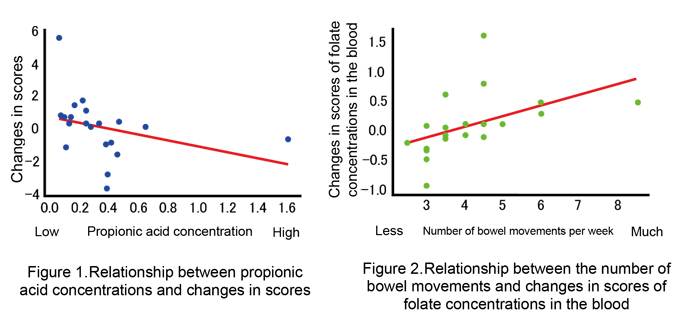- TOP
- List of reports
- The Nutritional Efficacy of Chlorella Supplementation Designs on the Individual Gut Environment:
A Randomised Control Study
The Nutritional Efficacy of Chlorella Supplementation Designs on the Individual Gut Environment: A Randomised Control Study
【Scientific information】
Research and Development Department, Sun Chlorella Corporation
The Nutritional Efficacy of Chlorella Supplementation Designs on the Individual Gut Environment: A Randomised Control Study
Published in the “Frontiers in Nutrition” journal (2020 Impact Factor 6.576)
- Research objectives
- Chlorella has attracted attention in recent years as a plant-based whole food that contains a good balance of nutrients such as protein, vitamin B12, folate, and lutein. To date, the intake of chlorella has been reported not only to increase the concentration of lutein, vitamin B12, and folate in the body, but also improve the status of bowel movements. However, the benefits of chlorella intake on the intestinal environment and health through intestinal bacteria have not been known. Thus, Sun Chlorella and Metabologenomics, Inc. conducted a joint study to evaluate the benefits of chlorella intake on the intestinal environment and health through comprehensive analyses.
The article can be accessed for free.
- Study method
- A total of 40 females (aged 20 to less than 60 years) with a tendency towards constipation and had 3 to 5 bowel movements per week were divided into Group A and Group B (20 per group), and received either chlorella or placebo at a daily dose of 6 g according to the following schedule. The effects of chlorella intake were evaluated by comprehensively measuring the status of bowel movements during the study period, folate concentrations in the blood at the start and end of the study, and intestinal flora and fecal metabolites.

- Results
- The intake of chlorella increased the fecal concentration of "azelaic acid," which has been reported to improve blood glucose levels. In addition, among individuals with low fecal concentrations of propionic acid, which is known to have anti-inflammatory and anti-obesity effects, changes in scores of propionic acid increased (Figure 1), and changes in scores of folate in the blood increased as the number of bowel movements increased. (Figure 2)

Details
- Journal:
- Frontiers in Nutrition 31 May 2021
- Title:
- The Nutritional Efficacy of Chlorella Supplementation Designs on the Individual Gut Environment: A Randomised Control Study
- Authors:
- Yuichiro Nishimoto1, Tatsuhiro Nomaguchi1, Yuka Mori1, Masaki Ito1, Yuya Nakamura1, Masaki Fujishima2, Shinnosuke Murakami1,3, Takuji Yamada1,4, Shinji Fukuda1,3,5,6
- Affiliation:
- 1) Metabologenomics, Inc., 2) Sun Chlorella Corp., 3) Institute for Advanced Biosciences, Keio University, 4) Department of Life Science and Technology, Tokyo Institute of Technology, 5) Intestinal Microbiota Project, Kanagawa Institute of Industrial Science and Technology, 6) Transborder Medical Research Center, University of Tsukuba





